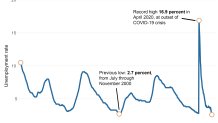
The Massachusetts economy continues to hum along in the wake of the COVID-19 pandemic's disruption, a trend that business leaders and analysts say could forecast more inflationary pressure on the horizon.

With employers across the state still struggling to fill open positions, labor officials reported Friday that the statewide unemployment rate ticked downward one-fifth of percentage point to 2.6% in June -- the lowest single-month rate since at least 1976.
The new record low is a preliminary estimate, and officials might revise the unemployment rate upward when they release the next batch of data in August. Some experts also caution against reading too much into the difference between a 2.6% unemployment rate and the previous record of 2.7% set each month between July and November 2000.
Get New England news, weather forecasts and entertainment stories to your inbox. Sign up for NECN newsletters.
But the broader trend -- nearly a year and a half with unemployment at or below 4% -- still represents a significant turnaround since the public health emergency prompted massive layoffs in 2020.
"It's incredible how low the unemployment rate is," said Evan Horowitz, executive director of the nonpartisan Center for State Policy Analysis at Tufts University. "It is an extremely low level of unemployment, which means an extremely tight job market. It's very good for workers, and a sign of the historic strength of the economy, comparable only to a brief window in the late '90s."
The Massachusetts unemployment rate in June was a full point below the national unemployment rate of 3.6% in the same month, according to Bureau of Labor Statistics data reported by the state Executive Office of Labor and Workforce Development.
Local
The low jobless rate comes as businesses across sectors in Massachusetts report trouble attracting and retaining qualified candidates for open jobs, and as state officials wrestle with tax and policy reforms to address the high cost of living here.
"This confirms what most employers are seeing on the ground: it's still a tough slog to try and find qualified employees," said Christopher Geehern, executive vice president at the Associated Industries of Massachusetts. "We've all had the experience of going into restaurants where they're on a skeleton crew. All kinds of businesses are still trying to staff up and hire the kind of people they need to grow."
The data show June had a labor force participation rate of 64.6%, one of the lowest single-month rates in the past four decades. That could drive down the unemployment rate, which does not count jobless people who are not actively seeking work.
Eric Merlis, managing director and co-head of global markets at Citizens, attributed much of the success to the state economy's diversity and its lack of reliance on a single sector.
"This historically low unemployment rate should allay some of the broader fears about the state of this region's economy and provide assurance we remain on good footing. Our bankers work with a diverse range of clients across many of the state's key industries on a daily basis. This diversity speaks to the resilience of the local economy so it is not a surprise our employment situation is better than it is nationally," Merlis said in a statement. "Despite some ongoing concerns about the national economy and recent layoffs, many of our major employers never over-hired and had less of a need to reduce costs. There are clearly a lot of positives about working and growing a business in Massachusetts."
Economists for months have been debating the likelihood of the U.S. slipping into a recession. Horowitz on Friday echoed sentiment that's been churning in economic circles: there's growing consensus that "the broad economic picture is stronger than people expected and the risk of recession more limited."
Still, he said there's some risk potential. If the unemployment rate drops too low, the high wages businesses need to pay to attract workers could push inflation up.
"When people talk about recession risks, that's what they're worried about: inflation goes back up, the Federal Reserve has to hike even more, they have no choice but to drive the economy into recession, deliberately, basically, and that becomes the model," Horowitz said. "It's a little counterintuitive -- it's so good that it's risky -- but that's the situation."
Geehern, who called the chances of a recession "a coin flip," said he expects the Federal Reserve will pursue at least one more interest rate hike with unemployment low and wages rising.
"The good part about 2.6% unemployment is there are a lot of people working. There's a tremendous amount of opportunity here in Massachusetts," he said. "The sobering part of it is that employers are going to have to continue paying more to get the workers they want and that's going to push up wages, and that doesn't help the inflationary numbers."
Labor officials calculate the unemployment rate using a survey of households, and they also produce monthly estimates of jobs added or lost based on a separate survey of businesses.
Preliminary estimates show Massachusetts lost 4,500 jobs in June, EOLWD said. It appears to be the first month-over-month decline since September.
Geehern said the jobs survey is "probably more of a leading indicator" about where the economy is headed.
"I think, ultimately, what we'll see is those jobs numbers will eventually push up the unemployment rate a bit," he said, adding, "What we're seeing is the job market remains tight, job market is resilient, seeing some signs of a slowdown that will eventually translate into the unemployment rate."
The month-over-month drop was driven by the loss of 2,400 jobs in other services, 2,100 in education and health services, 900 in government, 800 in information, 500 in manufacturing and 300 in trade, transportation and utilities.
Financial activities, professional, scientific and business services, and leisure and hospitality sectors all reported job gains in June.
Massachusetts employers have collectively added 96,200 positions from June 2022 to June 2023, officials said.



